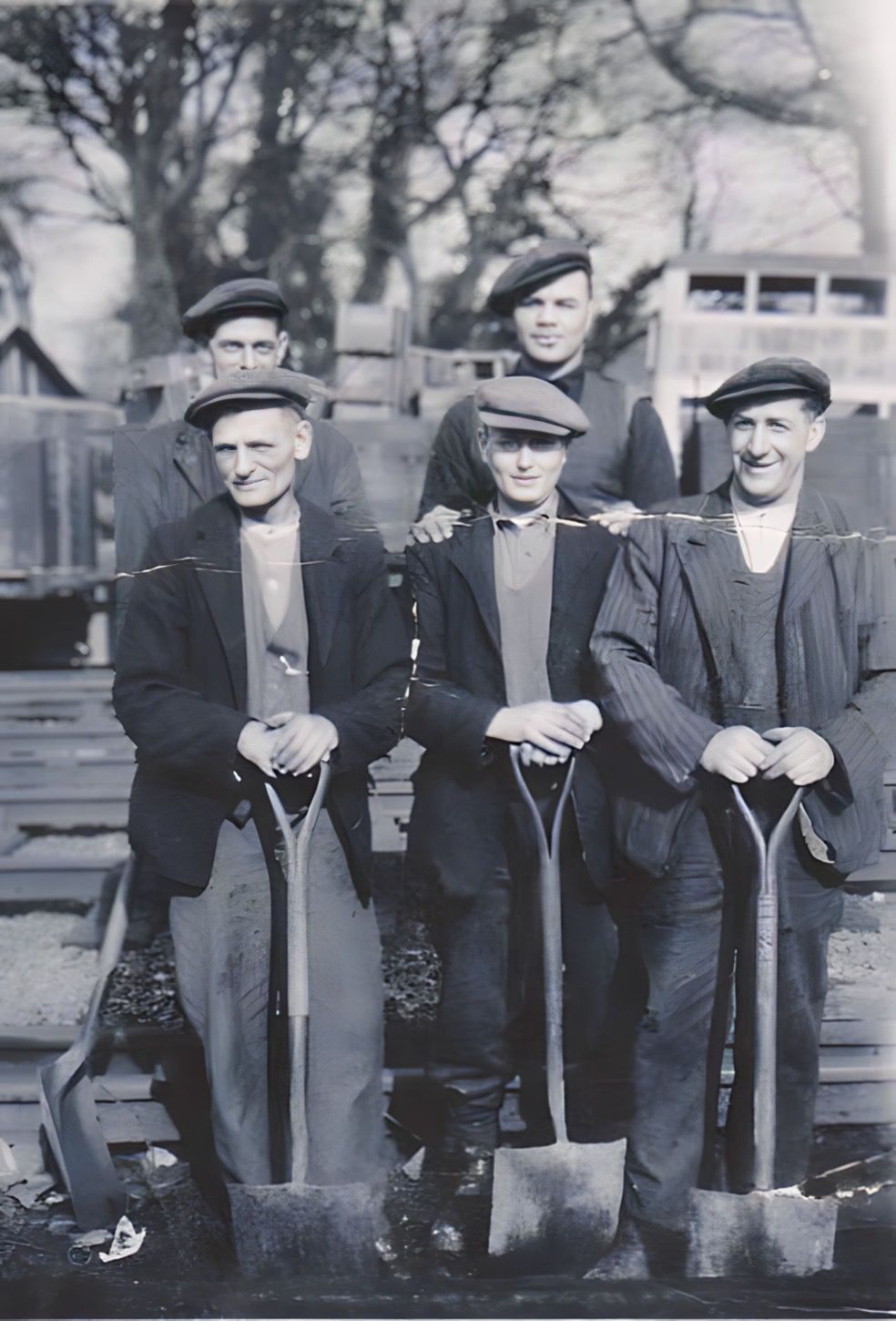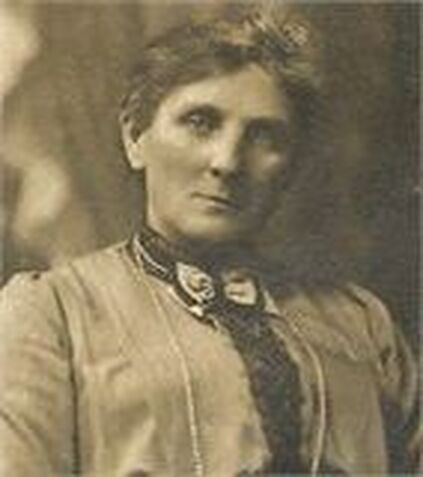|
Frank “Codger” Smith
Angela Oliver and Peter Treasure November 2023 Frank Smith (3 January 1896-1985) was known locally as “Codger” but he never liked that term and would always correct people who used the nickname. It is not clear where the nickname came from because it was used when he was still young. The marvel of people with a disability is not their unusualness but their success in overcoming disadvantage and their underlying normality. This was certainly true of Frank who overcame a mental handicap to become one of the most popular people in Box. The cause of his learning difficulty was never diagnosed but he might have been on the spectrum of autism. Finding Codger Smith Tracing the parents of a child called Smith is like looking for a needle in a haystack. At first, I thought that he might have been the son of Alfred Smith (1856-1932), stone sawyer and later gardener for Rev Sweetapple, and Mary Ann Price (1861-1941). The family had lived at 7 High Street (sometimes called Bath Road) in the house next to the path to Fairmead View. The Smith family had probably occupied the house since the time that the terrace was built about 1901. But the facts do not fit fully and, although Frank may have been related, these were not his parents. |
|
Frank’s childhood was more difficult than I had imagined.[1]
The Benjamin family had anecdotal evidence that Frank was the half-brother of Charles George Benjamin, stone quarryman from Box Hill. This made Frank the son of Elizabeth Neate and her second husband, George Smith, a widower. By the time of Frank’s birth on 3 January 1896, there were 2 surviving children from Elizabeth’s first marriage, 3 from her husband’s first marriage, and 7 children from Elizabeth and George’s marriage (plus a total of 7 infants who had already died). Frank was the youngest child and we might surmise that parental affection was limited even before his father died when he was only 6-months old. Elizabeth married for a third time a year later to Charles George Benjamin and there were 2 children from that relationship before Charles was hospitalised in 1905 with post-traumatic stress disorder. Apparently, he would wake up screaming in the night brought about by re-imagining a rock fall at work. He died a year later at Roundway County Asylum. |
As a single parent struggling to bring up children, Elizabeth also had to earn money to pay the rent of her tenanted cottage on Box Hill and served as the village mid wife.
Life in Box
Despite his learning difficulties, Frank was determined to be regarded the same as other people. It is uncertain where the nickname originated. In the clothing industry it was a reference to the person who altered clothes to make them fit but probably
it was intended to refer to his slowness caused by his learning difficulties. Despite these issues, Frank worked all his life.
For some time, he was employed as part of a rail maintenance crew for GWR and in the 1930s he became a runner, delivering messages, medications and helping the practice of a Bath surgeon.
Frank wanted to serve in the Second World War but he clearly was not fit for service, a liability for his colleagues and himself. Undeterred, he was admitted into a support role and spent most of the wartime in the kitchen peeling potatoes to feed other servicemen – a vital part of the military effort, although somewhat unglamorous.
In the 1950s Frank lived with the family of the niece of Charles George Benjamin at the newly-built Bargates. He continued to work and was employed by Box Parish Council as the village road cleaner, keeping the streets clean, tidy and tirelessly making sure the bus stops were respectable.
Character and Anecdotes
Kindness was inherent in Frank’s nature and numerous people speak of his willingness to help them. One time, he had injured himself and had been assisted by Joseph Gape, retired Box policeman, and his wife Winifred, who lived at 24 Fairmead View. Thereafter Frank resolved to return that favour, especially after Joseph’s death in 1960. He would regularly collect and transport Winifred’s weekly shopping. He took a handwritten note of her meat order to the butcher’s run by Jimmy Hill in the Market Place. After he brought it back to Winifred, she made him a cup of Bovril and slice of toast. He also looked after the garden at 24 Fairmead View and Winifred bought him new shoes when needed.
There are many local stories about Codger Smith. The most frequent concerns his football exploits when he reputedly played with his flat cap on and had to remove it to head the ball. Codger was a good footballer who is alleged to have been offered a trial for Charlton Athletic as a professional but did not turn up because he was too drunk from the previous night. Who knows how true the story is?
Another anecdote concerns the inquest of Ben Vezey in 1930. An open verdict was returned, although suspicions existed that it was sadly a case of suicide when Ben stepped in front of a railway engine. Ben’s relative, Clive Banks who recalled that Codger was a member of the railway gang who found Ben’s body. Codger mentioned that he had seen Ben the previous day in the garden of Hill View and wished him Goodnight, Mr Vezey. Ben just said You will all be rich men before I am out of debt. Codger recalled thinking at the time that this was rather odd.
In later life, Frank took a job as the local roadsweeper. He had a cart with two brand new brushes and followed earlier employees Kruger Barnett before passing the role on to his successor Larry Cotter. But was unsure how to use the equipment and where to dispose black bags of rubbish.[2] So he would pick up rubbisg from the road and toss it over a nearby hedge or garden, incuding down into the Old Dairy from the main road.
Life in Box
Despite his learning difficulties, Frank was determined to be regarded the same as other people. It is uncertain where the nickname originated. In the clothing industry it was a reference to the person who altered clothes to make them fit but probably
it was intended to refer to his slowness caused by his learning difficulties. Despite these issues, Frank worked all his life.
For some time, he was employed as part of a rail maintenance crew for GWR and in the 1930s he became a runner, delivering messages, medications and helping the practice of a Bath surgeon.
Frank wanted to serve in the Second World War but he clearly was not fit for service, a liability for his colleagues and himself. Undeterred, he was admitted into a support role and spent most of the wartime in the kitchen peeling potatoes to feed other servicemen – a vital part of the military effort, although somewhat unglamorous.
In the 1950s Frank lived with the family of the niece of Charles George Benjamin at the newly-built Bargates. He continued to work and was employed by Box Parish Council as the village road cleaner, keeping the streets clean, tidy and tirelessly making sure the bus stops were respectable.
Character and Anecdotes
Kindness was inherent in Frank’s nature and numerous people speak of his willingness to help them. One time, he had injured himself and had been assisted by Joseph Gape, retired Box policeman, and his wife Winifred, who lived at 24 Fairmead View. Thereafter Frank resolved to return that favour, especially after Joseph’s death in 1960. He would regularly collect and transport Winifred’s weekly shopping. He took a handwritten note of her meat order to the butcher’s run by Jimmy Hill in the Market Place. After he brought it back to Winifred, she made him a cup of Bovril and slice of toast. He also looked after the garden at 24 Fairmead View and Winifred bought him new shoes when needed.
There are many local stories about Codger Smith. The most frequent concerns his football exploits when he reputedly played with his flat cap on and had to remove it to head the ball. Codger was a good footballer who is alleged to have been offered a trial for Charlton Athletic as a professional but did not turn up because he was too drunk from the previous night. Who knows how true the story is?
Another anecdote concerns the inquest of Ben Vezey in 1930. An open verdict was returned, although suspicions existed that it was sadly a case of suicide when Ben stepped in front of a railway engine. Ben’s relative, Clive Banks who recalled that Codger was a member of the railway gang who found Ben’s body. Codger mentioned that he had seen Ben the previous day in the garden of Hill View and wished him Goodnight, Mr Vezey. Ben just said You will all be rich men before I am out of debt. Codger recalled thinking at the time that this was rather odd.
In later life, Frank took a job as the local roadsweeper. He had a cart with two brand new brushes and followed earlier employees Kruger Barnett before passing the role on to his successor Larry Cotter. But was unsure how to use the equipment and where to dispose black bags of rubbish.[2] So he would pick up rubbisg from the road and toss it over a nearby hedge or garden, incuding down into the Old Dairy from the main road.
Hopefully the world has moved on since people with a disability were regarded as an object of fun. The circumstances of
Frank Smith reveal his disadvanted upbringing and his life shows his determination to achieve to his full potential. He is remembered with affection and respect for the person he became.
Frank Smith reveal his disadvanted upbringing and his life shows his determination to achieve to his full potential. He is remembered with affection and respect for the person he became.
Reference
[1] I am very grateful to Peter Treasure and Keith Benjamin for their help with this identification
[2] Courtesy Bob Hancock
[1] I am very grateful to Peter Treasure and Keith Benjamin for their help with this identification
[2] Courtesy Bob Hancock

